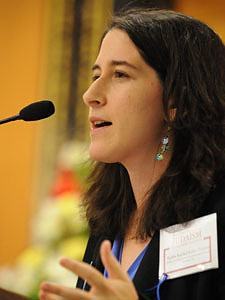Chukkat
As the Israelites wind down their adventures in the desert and prepare to enter the Promised Land as a free generation, they must again confront their faith in God’s ability to protect and provide for them. At the heart of Parashat Chukkat is the puzzling episode of Moses and the rock that yields water. Through Moses and the costly mistake that he makes, this parashah teaches us the proper way to express trust in God. The challenges that Moses and the Israelites face in finding the right way to engage in and express their belief in God challenge us to think about the ways we demonstrate commitment to our values in the public sphere.
Read More
